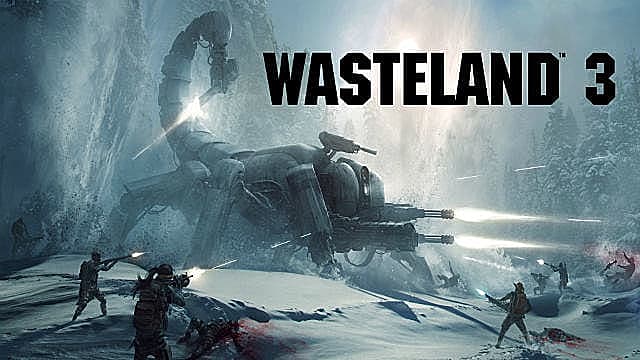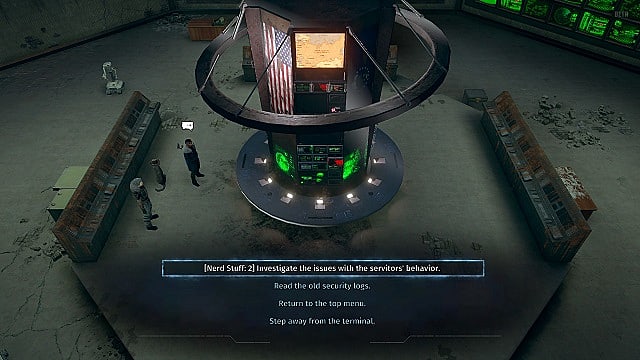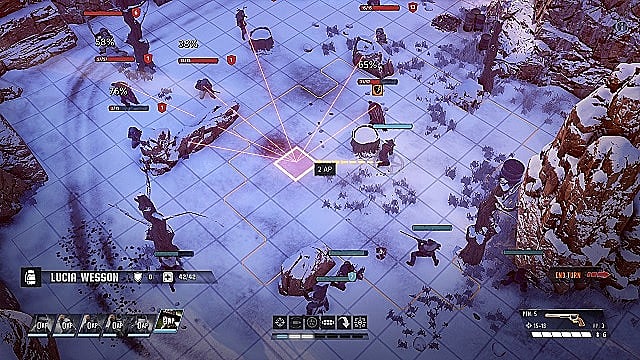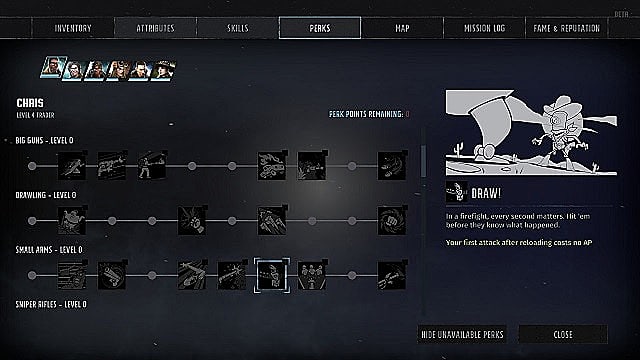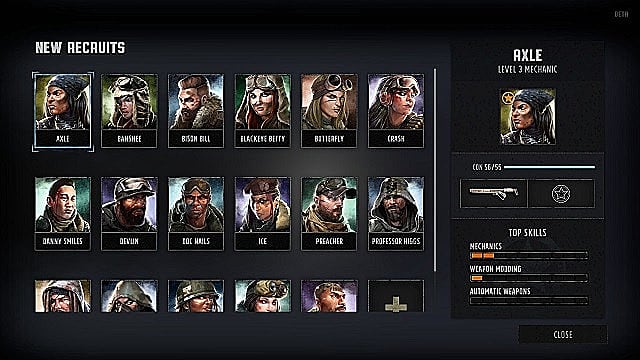While it’s still due to hit the PS4 per backer requirements, this post-apocalyptic RPG will also be included in Game Pass, bringing the anticipated Wasteland 2 follow-up to a wider audience of PC and Xbox players.
We got a take an advance look at the first four hours of Wasteland 3 and are ready to share what we experienced out in the cold, harsh apocalyptic wasteland.
Big Changes Besides the Snowy Setting
From Wasteland 3’s first moments, it’s very clear the Fig backing and resources provided by Microsoft have changed things in the wasteland, and I don’t just mean the swap from brown, dusty Arizona to cold, snowy Colorado.
With the setting of the desert sun and the rise of irradiated blizzards, we’re exploring a darker version of the wasteland that the humor-focused E3 trailer really didn’t reveal. That’s not to say that there isn’t a good deal of comic relief to be found in these early hours, but the overall humor has a decidedly grim tone.
This satisfying blend of post-apocalyptic horror and deadpan comedy succeeds to infuse the game with dark humor significantly better than, say, The Outer Worlds did last year. And that balance is showcased in Wasteland 3’s character lineup as well, where you are free to take the campaign to one extreme or the other in what will undoubtedly be just the first of several play-throughs.
Whether you load up on recruited ranger fodder to even out your skill types or fill your party with full companions who have their own backstories, options always abound.
Taking that further, every area is loaded with opportunities other than just loot. You’ll be able to find more info or access extra goodies by having specific skills or party lineups. Even though the game’s overall skill selection has been reduced from Wasteland 2 (which is actually a good thing we’ll cover a bit below), it’s still unlikely you will have a lineup that lets you see everything in just one go.
Wasteland 3 immediately showcases the importance of choice and how events will change based on what conversation skills you take. In this case, your choice to save someone from certain doom actually makes a second combat scenario harder. But it also has a potential reward down the line when that character decided to join the group, for example.
Events of that nature pop up everywhere you go and offer plenty of chances to play good, evil, or somewhere in between. Your ranger party might decide to keep someone who’s been incarcerated so long he’s gone insane locked up, or instead set them free and take your chances. Both decisions, however, have big repercussions.
While these skill and conversation-based options are increased over Wasteland 2, there are other, more basic changes to gameplay that some will love and others might find too simplistic.
In particular, Wasteland 3 goes out of its way to streamline several of the series’ more obtuse elements (some might call them “classic” or “old-school” elements instead).
You no longer need to have a shovel taking up a spot in your inventory to dig up hidden items, not that it would matter, because there’s not a limit to inventory space now either. There’s also now a shared inventory, so you don’t need to constantly shuffle 7.62MM ammo between characters.
Some players found that incredibly annoying in the previous game (yup, I’m some players), while others will no doubt feel the game is catering to filthy casuals (Hi, I’m also a filthy casual. Nice to meet you, elitist swine).
Another simple change eradicates the save scumming issue inherent to Wasteland 2’s gameplay. There’s no longer a percentage chance to succeed or fail at any given skill check. If a lock is Level 7, you just need 7 points in lockpick to open it without a chance of failure.
The biggest change has, though, has to be the inclusion of customizable vehicles for players and enemies. Essentially acting as a party member, they are more than just transportation. They can use deadly weapons or end up terrible death traps if someone with a flamethrower gets close in combat.
While those changes may make the game feel somewhat simpler than its predecessor, others radically increase the options available. Sadly, we didn’t get a chance to venture out into the world map in the preview build, but it’s clear there’s going to be plenty to do with Wasteland 3’s many expanded mechanics.
Updating Wasteland’s Combat
Turn-based combat, which is a huge part of the overall experience, will feel familiar to veteran players, but there are some important updates and overhauls.
Working off the game’s darker tone, there are some truly bloody effects tied to certain combat abilities that put the bullet dismemberment from Fallout 2 to shame.
It’s not just aesthetics that have changed, though. Entirely new mechanics like the strike meter, which lets your rangers use special kinds of attacks after building up the meter during combat, have been added.
End-turn strategy sees a big shift as well. Previously, you could only transfer unused action points, but now there two extra options: defending to take less damage if you get caught out of cover, or ambushing, which is basically overwatch. Both are welcome additions to the roster of final actions that extend your strategic options.
Some elements have remained similar to the previous entry in the series, too, like small-gun, high-action-point builds dominating in the early game. But, thankfully, there is significantly more variety with combat builds overall. Unarmed brawlers, for instance, are now much more viable and are basically 3rd edition D&D monks that can dish out crazy damage with the right perks and skills.
Fists, bullets, knives, and explosives aren’t the only weapons you’ll be playing with, either. Taking a page from turn-based fantasy RPGs, there are some fun elemental effects available, like frozen and burning, and they usually arrive in wonderfully deadpan ways… like chucking a yellow snowball at an enemy. Yes, you have to choose to unzip and turn them yellow first if you want to use those yucky (but useful) items in combat.
That’s just the tip of the iceberg, though, as there are plenty of ways to interact with the environment during combat I don’t want to spoil. Instead, let’s take a deeper look at more of the skill modifications available in Wasteland 3.
Skill and Perk Changes
If you’re familiar with the previous two Wasteland games, you know that everything in and out of combat revolves around skill points and perks.
Interestingly, entire skills get wiped out and condensed. Most importantly, skills like field medic and surgeon are combined into the first aid skill; it’s a very welcome change from Wasteland 2 where you needed two characters with the surgeon skill and had to ensure they kept each other alive or your game was essentially over.
On the opposite end, the deadly Mangler and similar rocket-launcher-style items now require the explosives skill to use, so you can’t just load up your squad with high explosive secondary weapons to cheese through combat on easy mode.
Further enhancing combat and the game’s new ailment types, perks from different weapon skill trees dovetail really well now. Increasing those interconnected options means it’s no longer the best idea to just have everyone equip assault rifles. Now your ranger squad will keep busy triggering status effects with one type of weapon skill and then exploiting that weakness with a different character using a separate weapon perk tree.
The number of perks already available for both combat and exploration skills tease a wide range of possibilities, but I have to wonder if some extra perks are going to show up in a patch or as DLC. Some obvious entries seem missing at the moment, as hard-ass, kiss-ass, and lock picking all lack any perks at all.
Some Needed Tweaks and What to Expect Overall
Wasteland 3’s early Beta preview shows a ton of promise for an even better post-apocalyptic adventure than we’ve seen from InXile before. Of course, since development is still continuing, there were a number of bugs and known issues still getting ironed out.
Many of these are minor, like missing text strings, dialog boxes staying on the screen longer than they should, or weapon mod stats displaying incorrectly, and will clearly see fixes ahead of release.
There’s one issue, though, that has me worried: Wasteland 3’s exceedingly long load times. Even with an i7-8750 CPU and an SSD, starting the game takes an absurd amount of time, and I shudder to think of what it will be like on a potato computer if it’s permanent.
Bugs and load times aside, there’s no question Wasteland 3 is both more polished and more streamlined than the previous game. Clearly meant to have a wider appeal, Wasteland 3 is no longer aimed specifically at the hardcore, old-school CRPG crowd. If you crave the total lack of hand-holding inherent to old-school game design, the remaster of the original Wasteland might be more up your alley. But only time will tell, and we’ll know a lot more once we get our hands on the review build.
For those who want to jump in and see how Colorado has fared after the end of the world, the backer Beta starts March 17. Wasteland 3’s full launch is currently slated for May 19 for PC, PS4, and Xbox One.
